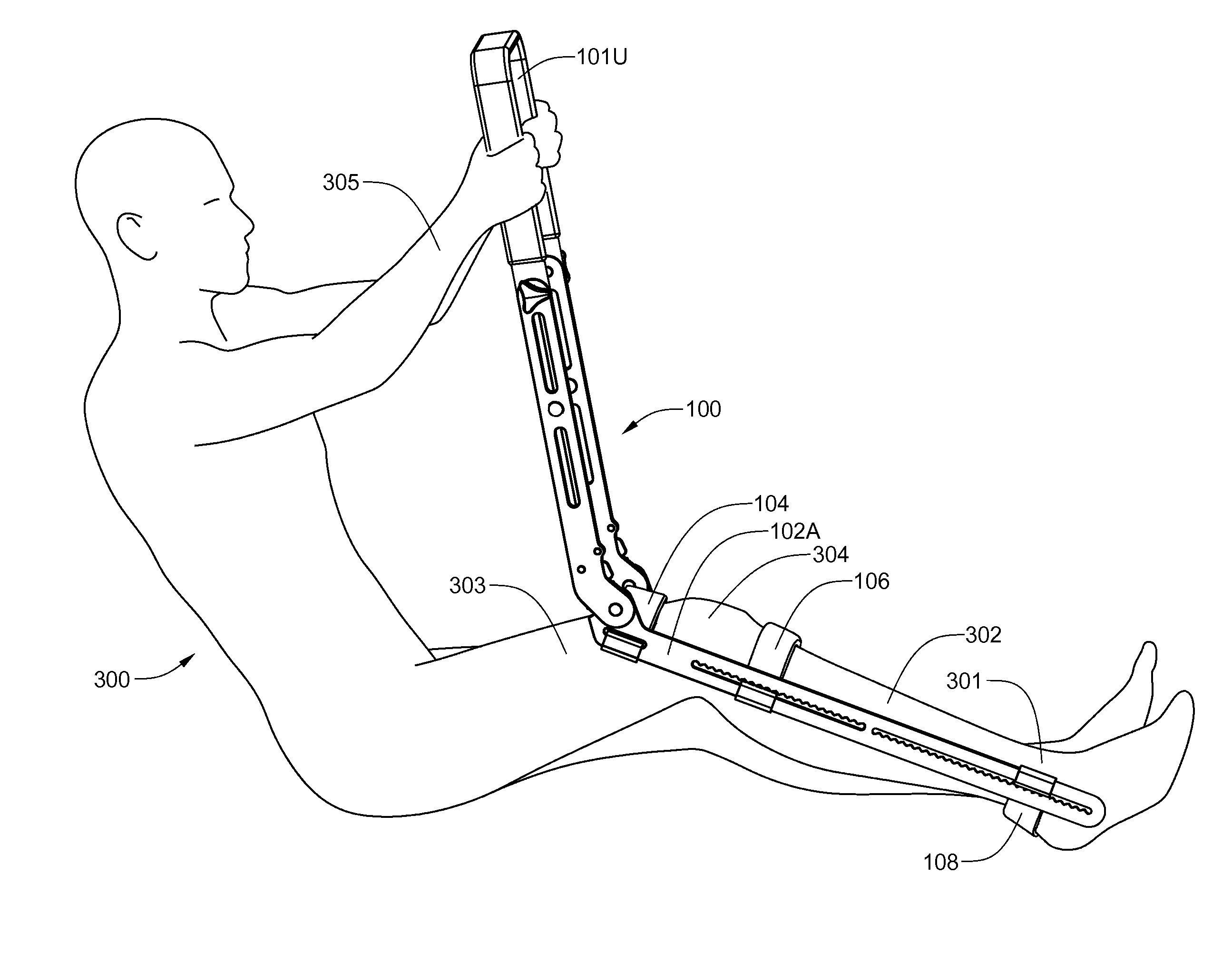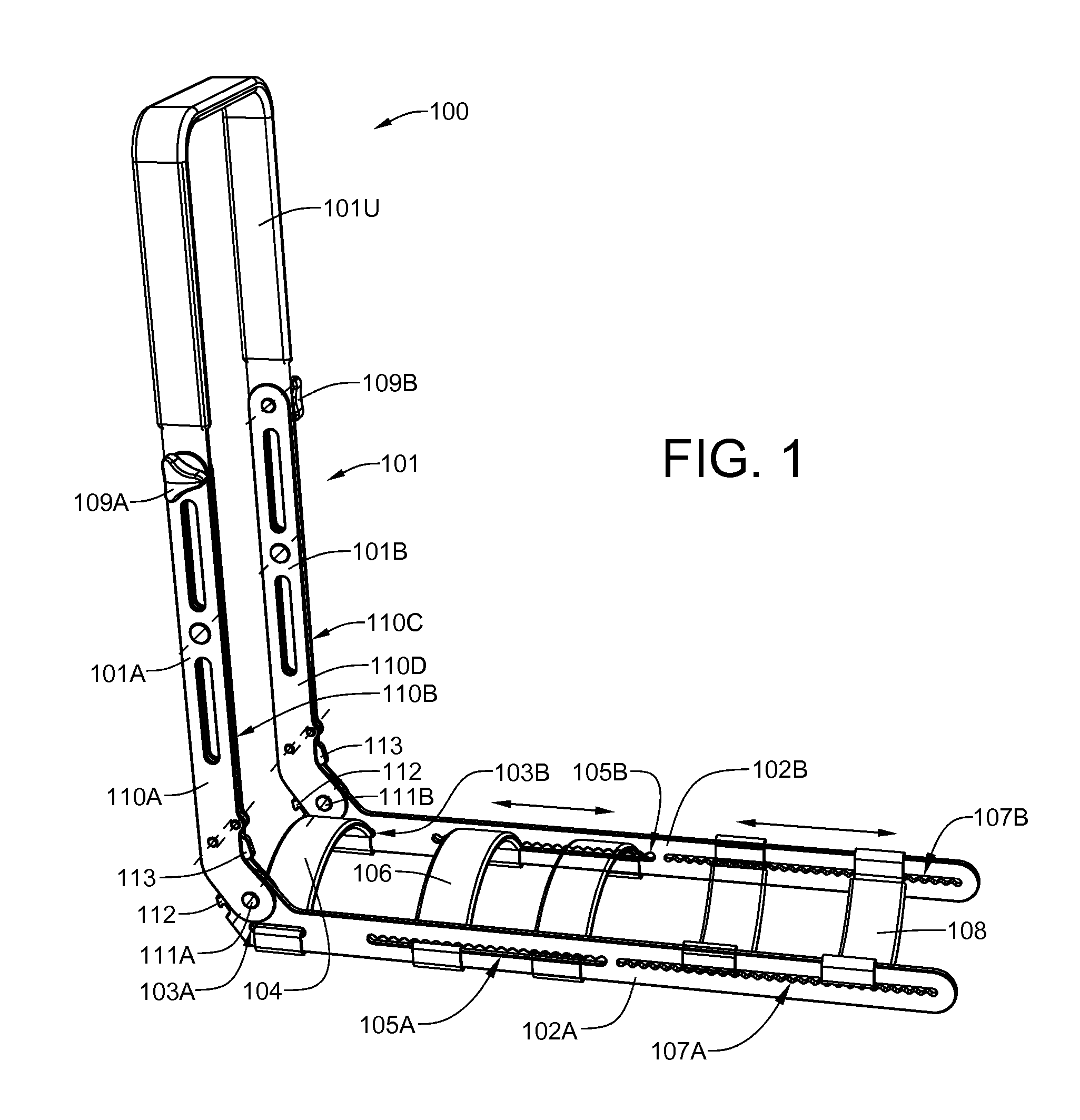Knee rehabilitation device
a rehabilitation device and knee technology, applied in the field of mechanical devices, can solve the problems of extension contracture, loss of ability to flex the body joint,
- Summary
- Abstract
- Description
- Claims
- Application Information
AI Technical Summary
Benefits of technology
Problems solved by technology
Method used
Image
Examples
first embodiment
[0042]Referring now to FIG. 3, the first embodiment knee rehabilitation device 100 is shown being used by a patient 300 in its standard operational mode.
[0043]Referring now to FIGS. 4, 5 and 6, the first embodiment knee rehabilitation device 100 is being used by a patient 300 to rotate his knee 401 through various degrees of motion in FIGS. 4 and 5 to full extension in FIG. 6. It will be noted that for this therapy regime, the upper sling 104 (also referred to as a band) is positioned on the anterior portion of the thigh 303 just above the knee 304, the middle sling 106 passes over the anterior portion of the lower leg 302 just below the knee 304, and the lower sling 108 supports the lower leg 302 just posterior to the ankle 301. FIGS. 4, 5 and 6 show the first embodiment knee rehabilitation device in use by a patient 300 in its first, or standard, configuration, with the upper sling 104 positioned just above the knee 304 on the anterior of the patient's thigh 303, the middle sling ...
third embodiment
[0053]Referring now to FIGS. 18 and 19, a third embodiment knee rehabilitation device 1800 has a non-adjustable tubular metal frame 1801 in which the handle portion 1801A is rigidly affixed to a leg support portion 1801B. An upper strap 1802, a middle strap 1803 and a lower strap 1804 can be slidably positioned along the parallel tubes of the leg support portion 1801B.
fourth embodiment
[0054]Referring now to FIGS. 20, 21 and 22, a fourth embodiment knee rehabilitation device 2000 has a non-adjustable frame 2001 made of a pair of laminar sheet material components 2001A and 2001B disposed in a mutually-parallel configuration. The laminar sheet material can be a structural metal such as aluminum, steel alloys, stainless steel alloys, magnesium alloys and titanium. It can also be a polymeric material, such as polyester thermoplastic resin that is reinforced by structural fibers such as para-aramid (e.g., Kevlar®), glass and carbon. Each of the frame components 2001A and 2001B is reminiscent of a hockey stick or boomerang, with a first end 2002A and 2002B of each serving as a handle and the other end 2003A and 2003B serving as half of the leg support portion. Front, middle and rear slings (2004, 2005 and 2006, respectively) bridge the gap between the two frame components 2001A and 2001B. Each frame component is equipped with a pair of longitudinal slots 2007A, 2008A an...
PUM
 Login to View More
Login to View More Abstract
Description
Claims
Application Information
 Login to View More
Login to View More - R&D
- Intellectual Property
- Life Sciences
- Materials
- Tech Scout
- Unparalleled Data Quality
- Higher Quality Content
- 60% Fewer Hallucinations
Browse by: Latest US Patents, China's latest patents, Technical Efficacy Thesaurus, Application Domain, Technology Topic, Popular Technical Reports.
© 2025 PatSnap. All rights reserved.Legal|Privacy policy|Modern Slavery Act Transparency Statement|Sitemap|About US| Contact US: help@patsnap.com



